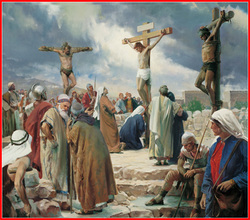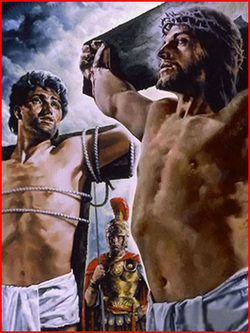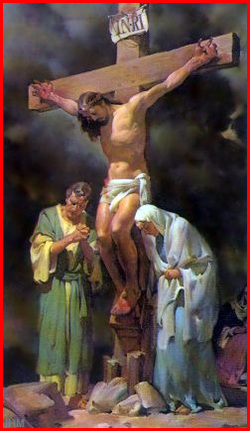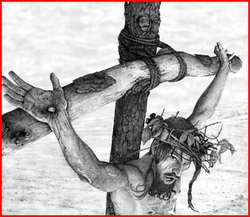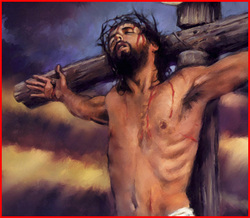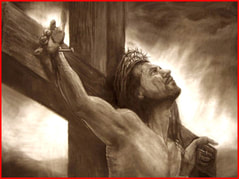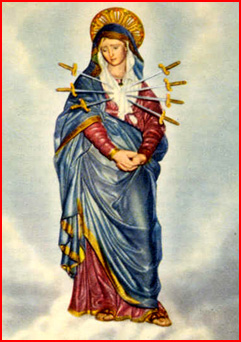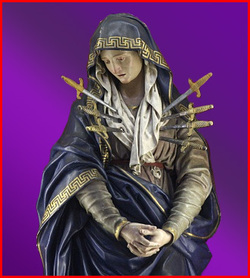| Devotion to Our Lady |
|
- Homepage
-
Daily Thoughts
- 2023 October Daily Thoughts
- Daily Thoughts Lent 2020
- Daily Thoughts for Advent 2019
- Daily Thoughts for October 2019
- Daily Thoughts for September 2019
- Daily Thoughts for August 2019
- Daily Thoughts for July
- Daily Thoughts for June
- Daily Thoughts for Easter 2019
- Daily Thoughts for Lent 2019
- Daily Thoughts for Christmas
- Daily Thoughts Easter 2022
- Sacred Heart
- Holy Ghost
-
Spiritual Life
- Holy Mass Explained
- First Friday Devotions
- First Saturday Devotions
- The Mercy of God
- Vocations
- The Path Everyone Must Walk >
- Gift of Failure
- Halloween or Hell-O-Ween?
- Ignatian Spiritual Exercises >
- Meditation is Soul-Saving
- Spiritual Communion
- Miraculous Medal
- Enrollment in Miraculous Medal
- St. Benedict Medal
- Holy Water
- Advice on Prayer
- Your Daily Mary
-
Prayers
- September Devotions
- Seven Sorrows of Our Lady
-
Novenas
>
- NV-Help of Christians
- NV-Nativity of Our Lady
- NV-Seven Sorrows
- NV- Sorrowful Heart
- NV-Pope St Pius X
- NV-La Salette
- NV-St Michael Archangel
- NV-Immaculate Heart
- NV-Assumption
- NV-Novena for Fathers
- NV-Novena for Your Mother
- NV-St Raphael Archangel
- NV-Souls in Purgatory
- NV-All Saints Day
- NV-Christ the King
- NV-Divine Motherhood
- NV-Guardian Angels
- NV-Rosary
- NV-Mirac Med
- NV- Imm Conc
- NV - Guadalupe
- NV - Nativity of Jesus
- NV-Epiphany
- NV-OL Good Success
- NV-Lourdes
- NV-St Patrick
- NV-St Joseph
- NV-Annunciation
- NV-St Louis de Montfort
- NV-OL Good Counsel
- NV-Last Supper
- NV-Passion
- NV-Pentecost
- NV-Ascension
- NV-Sacred Heart
- NV-Sacred Heart & Perpetual Help
- NV-Corpus Christi
- NV-OL of Perpetual Help
- NV-Queenship BVM
- NV-OL of Mount Carmel
- NV-St Mary Magdalen
- NV- Im Hrt
- August Devotions to IHM
- Immaculate Heart of Mary
- Litany of Dependence
- Prayers to St Mary Magdalen
- Prayers in Times of Sickness Disease & Danger
- Holy Souls in Purgatory
- Meditations on the Litany of Our Lady
- Special Feast Days
- Prayers to Mary (Mon-Sun)
- Litanies to Our Lady >
- Various & Special Needs
- Our Lady of the Rosary
- Our Lady of Mt. Carmel
- Our Lady of Perpetual Help
- Our Lady of Guadalupe
- Other titles of Our Lady
-
Rosary
- Downloads
- Consecration
- Easter Season
-
Holy Week
- Last Seven Words of Jesus >
- Characters of Passion >
- The Last Days of Christ
- Before Palm Sunday
- Palm Sunday
- Monday in Holy Week
- Tuesday in Holy Week
- Wednesday in Holy Week
- Holy Thursday (Last Supper)
- Holy Thursday (Agony & Arrest)
- Night Vigil with Christ
- Good Friday (Pilate & Herod)
- Good Friday (Way of Cross & Crucifixion)
- Saturday in Holy Week
-
Lent
- Ideas for Lent
- Daily Lenten Planner
- Daily Lenten Liturgy
- From Cold to Hot
- Lent with Aquinas
- Lent with Dom Gueranger
- Virtues for Lent
- History of Penance
- How Expensive is Sin?
- Confession of Sins
- Letter to Friends of the Cross
- Sermons for Lent
- Stations of the Cross >
- Lenten Prayers
- 7 Penitential Psalms
- Lenten Psalms SUN
- Lenten Psalms MON
- Lenten Psalms TUE
- Lenten Psalms WED
- Lenten Psalms THU
- Lenten Psalms FRI
- Lenten Psalms SAT
- Lenten Laughs
- Septuagesima
-
Christmas
- Epiphany Explained
- Suggestions for Christmas
- Food For Thought
- Christmas with Aquinas
- Christmas with Dom Gueranger
- Christmas Prayers
- Candles & Candlemas
- Christmas Sermons
- Christmas Prayers SUN
- Christmas Prayers MON
- Christmas Prayers TUE
- Christmas Prayers WED
- Christmas Prayers THU
- Christmas Prayers FRI
- Christmas Prayers SAT
- Twelve Days of Christmas >
-
Advent Journey
- Purgatory
- Christ the King
- Legion of Mary
- Scapular
-
Saints
-
Martyrs for the Faith
>
- Your Daily Martyr >
- All 365 Days of Martyrs
- Cristeros
- St Valentine & Valentine's Day
- Martyrs--Thomas Becket
- Martyrs--John the Apostle
- Holy Machabees
- Age of Martyrdom
- Carmelites of Compiegne
- Martyrs--Peter & Paul
- Martyrs--John the Baptist
- Martyrs--Andrew
- Martyrs--James the Great
- Martyrs--North American
- Martyrs--Seven Holy Sleepers
- Martyrs--Afra
- School of Martyrdom
- Martyrs--Christina
- Desert Saints >
- Saints for Sinners >
- Saints of Mary >
- History of All Saints Day
-
Martyrs for the Faith
>
- Precious Blood
- Synod 2023
-
Catechism
- Catechism Lesson 1
- Catechism Lesson 2
- Catechism Lesson 3
- Catechism Lesson 4
- Catechism Lesson 5
- Catechism Lesson 6
- Catechism Lesson 7
- Catechism Lesson 8
- Catechism Lesson 9
- Catechism Lesson 10
- Catechism Lesson 11
- Catechism Lesson 12
- Catechism Lesson 13
- Catechism Lesson 14
- Catechism Lesson 15
- Catechism Lesson 16
- Catechism Lesson 17
- Catechism Lesson 18
- Catechism Lesson 19
- Catechism Lesson 20
- Catechism Lesson 21
- Catechism Lesson 22
- Bible Study
-
Calendar
- Miracles
- Apparitions
- Shrines
- Prophecies
- Angels Homepage
- Hell
-
Church Crisis
- Conspiracy Theories
- Amazon Synod 2019 >
- Liberalism & Modernism
- Modernism--Encyclical Pascendi
- Modernism & Children
- Modernism--Documents
- The Francis Pages
- Church Enemies on Francis
- Francis Quotes
- Amoris Laetitia Critique
- Danger of Ignorance (Pius X)
- Restore all In Christ (Pius X)
- Catholic Action (Pius X)
- Another TITANIC Disaster?
- The "Errors of Russia"
- CRISIS PRAYERS
- Election Novena 2024
- The Anger Room
- War Zone
- Life of Mary
- Spiritual Gym
- Stupidity
- Coronavirus and Catholicism
- History & Facts
- Books
- Catholic Family
- Children
- Daily Quiz
-
Novena Church & Pope
- Day 01 Church-Pope Novena
- Day 02 Church-Pope Novena
- Day 03 Church-Pope Novena
- Day 04 Church-Pope Novena
- Day 05 Church-Pope Novena
- Day 06 Church-Pope Novena
- Day 07 Church-Pope Novena
- Day 08 Church-Pope Novena
- Day 09 Church-Pope Novena
- Day 10 Church-Pope Novena
- Day 11 Church-Pope Novena
- Day 12 Church-Pope Novena
- Day 13 Church-Pope Novena
- Day 14 Church-Pope Novena
- Day 15 Church-Pope Novena
- Day 16 Church-Pope Novena
- Day 17 Church-Pope Novena
- Day 18 Church-Pope Novena
- Day 19 Church-Pope Novena
- Day 20 Church-Pope Novena
- Day 21 Church-Pope Novena
- Day 22 Church-Pope Novena
- Day 23 Church-Pope Novena
- Day 24 Church-Pope Novena
- Day 25 Church-Pope Novena
- Day 26 Church-Pope Novena
- Day 27 Church-Pope Novena
- Day 28 Church-Pope Novena
- Day 29 Church-Pope Novena
- Day 30 Church-Pope Novena
- Day 31 Church-Pope Novena
- Day 32 Church-Pope Novena
- Day 33 Church-Pope Novena
- Day 34 Church-Pope Novena
- Day 35 Church-Pope Novena
- Day 36 Church-Pope Novena
- Day 37 Church-Pope Novena
- Day 38 Church-Pope Novena
- Day 39 Church-Pope Novena
- Day 40 Church-Pope Novena
- Day 41 Church-Pope Novena
- Day 42 Church-Pope Novena
- Day 43 Church-Pope Novena
- Day 44 Church-Pope Novena
- Day 45 Church-Pope Novena
- Day 46 Church-Pope Novena
- Day 47 Church-Pope Novena
- Day 48 Church-Pope Novena
- Day 49 Church-Pope Novena
- Day 50 Church-Pope Novena
- Day 51 Church-Pope Novena
- Day 52 Church-Pope Novena
- Day 53 Church-Pope Novena
- Day 54 Church-Pope Novena
- Penance Novena
- Daily WeAtheR Forecast
CLICK BELOW FOR THE NOVENA OF YOUR CHOICE (not all links are activated)
| PRAYERS (main page) | NOVENAS (main page) | EPIPHANY OF OUR LORD Jan 6 | OUR LADY OF GOOD SUCCESS Feb 2 | OUR LADY OF LOURDES Feb 11 | | ST. PATRICK Mar 17 | ST. JOSEPH Mar 19 | ANNUNCIATION March 25 | LAST SUPPER | PASSION OF OUR LORD | OUR LADY OF SORROWS Passiontide |
| OUR LADY OF GOOD COUNSEL Apr 26 | ST. LOUIS DE MONTFORT Apr 28 | QUEENSHIP OF MARY May 31 | ASCENSION OF OUR LORD | PENTECOST | | CORPUS CHRISTI | SACRED HEART | SACRED HEART & OUR LADY OF PERPETUAL HELP June 27 | OUR LADY OF PERPETUAL HELP June 27 |
| OUR LADY OF MT. CARMEL July 16 | ST. MARY MAGDALEN Jul 22 | ASSUMPTION Aug 15 | IMMACULATE HEART OF MARY Aug 22 Version 1 |
| IMMACULATE HEART Aug 22 Version 2 | POPE ST. PIUS X Sep 3 | NATIVITY OF OUR LADY Sept 8 | SEVEN SORROWS OF OUR LADY Sept 15 |
| OUR LADY OF LA SALETTE Sept 19 | ST MICHAEL ARCHANGEL Sep 29 | GUARDIAN ANGELS Oct 2 | OUR LADY OF THE ROSARY Oct 7 |
| DIVINE MOTHERHOOD OF OUR LADY Oct 11 | ST. RAPHAEL ARCHANGEL Oct 24 | CHRIST THE KING | ALL SAINTS DAY | SOULS IN PURGATORY | MIRACULOUS MEDAL Nov. 27 | IMMACULATE CONCEPTION Dec 8 | OUR LADY OF GUADALUPE Dec 12 | NATIVITY OF OUR LORD Dec 25 |
| NOVENA FOR MOTHERS | NOVENA FOR FATHERS |
| OTHER TITLES OF OUR LADY |
| PRAYERS (main page) | NOVENAS (main page) | EPIPHANY OF OUR LORD Jan 6 | OUR LADY OF GOOD SUCCESS Feb 2 | OUR LADY OF LOURDES Feb 11 | | ST. PATRICK Mar 17 | ST. JOSEPH Mar 19 | ANNUNCIATION March 25 | LAST SUPPER | PASSION OF OUR LORD | OUR LADY OF SORROWS Passiontide |
| OUR LADY OF GOOD COUNSEL Apr 26 | ST. LOUIS DE MONTFORT Apr 28 | QUEENSHIP OF MARY May 31 | ASCENSION OF OUR LORD | PENTECOST | | CORPUS CHRISTI | SACRED HEART | SACRED HEART & OUR LADY OF PERPETUAL HELP June 27 | OUR LADY OF PERPETUAL HELP June 27 |
| OUR LADY OF MT. CARMEL July 16 | ST. MARY MAGDALEN Jul 22 | ASSUMPTION Aug 15 | IMMACULATE HEART OF MARY Aug 22 Version 1 |
| IMMACULATE HEART Aug 22 Version 2 | POPE ST. PIUS X Sep 3 | NATIVITY OF OUR LADY Sept 8 | SEVEN SORROWS OF OUR LADY Sept 15 |
| OUR LADY OF LA SALETTE Sept 19 | ST MICHAEL ARCHANGEL Sep 29 | GUARDIAN ANGELS Oct 2 | OUR LADY OF THE ROSARY Oct 7 |
| DIVINE MOTHERHOOD OF OUR LADY Oct 11 | ST. RAPHAEL ARCHANGEL Oct 24 | CHRIST THE KING | ALL SAINTS DAY | SOULS IN PURGATORY | MIRACULOUS MEDAL Nov. 27 | IMMACULATE CONCEPTION Dec 8 | OUR LADY OF GUADALUPE Dec 12 | NATIVITY OF OUR LORD Dec 25 |
| NOVENA FOR MOTHERS | NOVENA FOR FATHERS |
| OTHER TITLES OF OUR LADY |
NOVENA IN PREPARATION FOR GOOD FRIDAY
(based upon the Last Seven Words of Jesus on the Cross)
(based upon the Last Seven Words of Jesus on the Cross)
What is a Novena?
A novena is a traditional devotion consisting of specific prayers recited on nine successive days. Besides being a form of praise, a novena is frequently offered for a particular intention. The first novena took place in the Cenacle, during the nine days preceding Pentecost, or the coming of the Holy Ghost. As a regular popular custom, this practice began in 12th century Christianity and continues to be beneficial today as a way of praying for healing, protection or other blessings for ourselves or others.
This particular novena is prayed to God in honor of and thanksgiving for the Passion and Death of Our Lord Jesus Christ, without which there would be no salvation. Though we speak of the Passion and Death of Our Lord, we must not imagine that He only experienced sorrows at the end of His life! His whole life was a life of constant suffering, which was crowned by the supreme sufferings undergone in His Passion and Death.
In praying this Novena, as in the case of all prayer, it is good to begin by opening ourselves wholeheartedly to God's will, offering a simple act of trust in God's wisdom and in His providential love for us all, that disposes all things for the ultimate benefit of our souls and their salvation.
How to Pray This Novena
This novena is based on the Seven Last Words spoken by Jesus while He was dying nailed to the Cross., including extracts from The City of God by the Venerable Mary of Agreda and The Dolorous Passion of Our Lord Jesus Christ by the Blessed Anne Catherine Ememrich. Each day of the novena is divided into the following parts: (1) a look at one of the Seven Last Words of Our Lord, with a reflection on the meaning and extent of those words; (2) if applicable, the actual account revealed by Our Lady to Venerable Mary of Agreda and Blessed Anne Catherine Emmerich; (3) an occasional quote from Holy Scripture wherever relevant; (4) an occasional quote from a saint or a pope; (5) a Prayer; (5) after mentioning your intention, pray the Our Father and the Hail Mary; (7) a Closing Prayer.
A novena is a traditional devotion consisting of specific prayers recited on nine successive days. Besides being a form of praise, a novena is frequently offered for a particular intention. The first novena took place in the Cenacle, during the nine days preceding Pentecost, or the coming of the Holy Ghost. As a regular popular custom, this practice began in 12th century Christianity and continues to be beneficial today as a way of praying for healing, protection or other blessings for ourselves or others.
This particular novena is prayed to God in honor of and thanksgiving for the Passion and Death of Our Lord Jesus Christ, without which there would be no salvation. Though we speak of the Passion and Death of Our Lord, we must not imagine that He only experienced sorrows at the end of His life! His whole life was a life of constant suffering, which was crowned by the supreme sufferings undergone in His Passion and Death.
In praying this Novena, as in the case of all prayer, it is good to begin by opening ourselves wholeheartedly to God's will, offering a simple act of trust in God's wisdom and in His providential love for us all, that disposes all things for the ultimate benefit of our souls and their salvation.
How to Pray This Novena
This novena is based on the Seven Last Words spoken by Jesus while He was dying nailed to the Cross., including extracts from The City of God by the Venerable Mary of Agreda and The Dolorous Passion of Our Lord Jesus Christ by the Blessed Anne Catherine Ememrich. Each day of the novena is divided into the following parts: (1) a look at one of the Seven Last Words of Our Lord, with a reflection on the meaning and extent of those words; (2) if applicable, the actual account revealed by Our Lady to Venerable Mary of Agreda and Blessed Anne Catherine Emmerich; (3) an occasional quote from Holy Scripture wherever relevant; (4) an occasional quote from a saint or a pope; (5) a Prayer; (5) after mentioning your intention, pray the Our Father and the Hail Mary; (7) a Closing Prayer.
Web Hosting by Just Host

